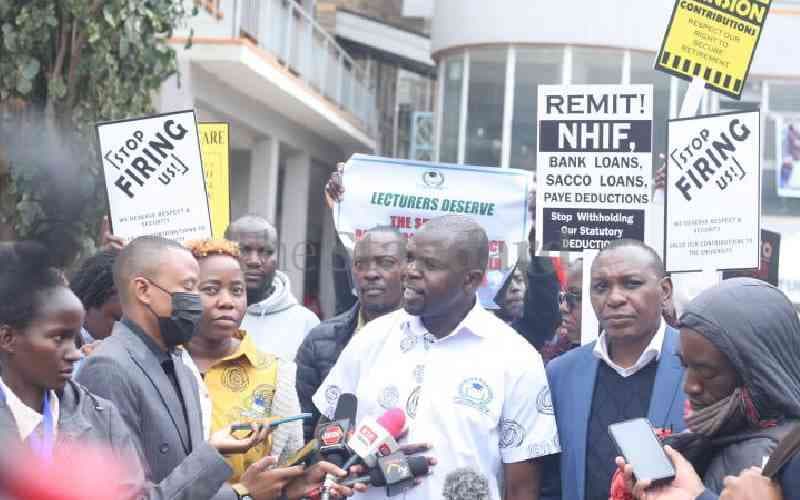We're loading the full news article for you. This includes the article content, images, author information, and related articles.
With public schools and universities facing crippling budget shortfalls, multi-million shilling donations to religious institutions by political leaders are under intense scrutiny, raising critical questions about Kenya's national development priorities and their impact on the nation's youth.

NAIROBI—A fierce national debate is intensifying across Kenya as the country grapples with a stark contrast in funding priorities. On one side, the education sector is buckling under the strain of chronic underfunding, with universities in crisis and basic education facing significant gaps. On the other, a deeply entrenched culture of large-scale, publicised donations by politicians to churches continues to flourish, prompting a critical examination of the nation's financial and moral compass. This divergence was recently highlighted in a Daily Nation opinion piece that called for a sharper focus on funding education over churches, reflecting a growing public sentiment.
Kenya's education sector, despite consistently receiving the largest share of the national budget, is facing a severe financial crisis. For the 2024/2025 fiscal year, the sector was allocated KES 656.6 billion. However, educational bodies report this amount is insufficient to meet the sector's needs. The Kenya Union of Post-Primary Education Teachers (KUPPET) has repeatedly warned of a looming crisis, citing massive budget cuts in key areas like teacher recruitment and national examinations.
The crisis is acutely felt in higher education. The Higher Education Loans Board (HELB) is facing a multi-billion shilling deficit, leaving over 100,000 students without government financial support in the 2024/2025 academic year. This has led to warnings of potential systemic failure across universities, which are already burdened with debts exceeding KES 60 billion for salaries and statutory remittances. The situation is also dire in basic education, where challenges include inadequate infrastructure for Junior Secondary Schools (JSS), delayed capitation funds, and a persistent teacher shortage.
In parallel, the flow of money from political figures to religious institutions remains a prominent and contentious feature of public life. President William Ruto has been a vocal defender of his substantial donations to churches, framing them as a moral and scriptural obligation. In March 2025, the President pledged a personal donation of KES 20 million and vowed to help raise an additional KES 100 million for the construction of the Jesus Winner Ministry church in Nairobi. These actions have sparked public protests, with many Kenyans arguing they represent misplaced priorities amid widespread economic hardship.
Legally, religious institutions in Kenya enjoy significant tax exemptions. Tithes, offerings, and donations are not considered taxable income under the Income Tax Act, a position upheld by the High Court. While churches are required to remit PAYE for their employees and pay VAT on commercial activities, their core income remains untaxed. This financial autonomy, combined with large political donations, has placed them at the centre of a debate on transparency and influence.
The controversy has elicited varied reactions. Several prominent church bodies have taken a firm stance against the practice. In late 2024 and early 2025, both the Kenya Conference of Catholic Bishops (KCCB) and the Anglican Church of Kenya (ACK) took steps to reject or discourage large, publicised donations from politicians, citing ethical concerns and the need to maintain the church's independence and neutrality. In March 2025, the National Council of Churches of Kenya (NCCK) issued guidelines banning political speeches from the pulpit and stipulating that politicians' contributions should not be publicly announced.
However, this view is not universally held within the clergy or the political class. Some church leaders continue to welcome the financial support, and politicians, including Majority Leader Kimani Ichung'wah, have defended their right to contribute, arguing they are often invited by the churches themselves. President Ruto remains unapologetic, stating that criticism will not deter him from supporting religious causes.
The ongoing debate underscores a fundamental tension in Kenyan society. As the government struggles to fund the education of its burgeoning youth population—a cornerstone of the Vision 2030 development blueprint—questions about accountability and the allocation of national resources become more urgent. The sight of millions being donated in church fundraisers while schools struggle to pay suppliers and students drop out for lack of fees presents a powerful and challenging narrative. For many Kenyans, the resolution of this conflict is not just a matter of fiscal policy, but a defining statement on the nation's commitment to its future generations.
Keep the conversation in one place—threads here stay linked to the story and in the forums.
Sign in to start a discussion
Start a conversation about this story and keep it linked here.
Other hot threads
E-sports and Gaming Community in Kenya
Active 9 months ago
The Role of Technology in Modern Agriculture (AgriTech)
Active 9 months ago
Popular Recreational Activities Across Counties
Active 9 months ago
Investing in Youth Sports Development Programs
Active 9 months ago